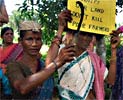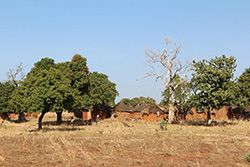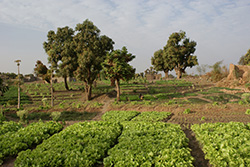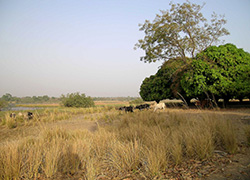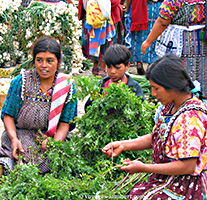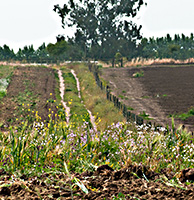A village in Western Africa – 1968
The secret agreement
It would be an exciting village meeting! All villagers from Togobala and its surrounding areas were rejoicing. It was the dull season of the Harmattan, the cold and dry winter wind when there was not much to do on the land.
Half of the villagers had gathered at Fama's place, the last descendant of the glorious, noble Doumbaya family. Recently, Fama had returned from the capital when the last tribal king had passed away. Because Fama was the last Doumbaya, it went without saying that he would become the new king.
The other half had gathered at the huts of the village committee. Since independence, the tribal leaders were abolished. Now, the villages were governed by village committees of the socialist party. For days, the local chairman Babou had fulminated against the 'contra-revolutionaries' and 'reactionaries'. They would make it very clear to Fama that the old times were over. No longer would the king and other rich farmers run the villages.
At Fama's place, everybody thought that the revolutionaries were rough slave sons who didn't know their place. They thought that independence and the revolution had brought nothing but more taxes and brazen contempt for the old customs.
On the agreed afternoon, Babou and his supporters came to the huts of Fama and his family because village meetings were traditionally held at the Doumbaya's place. To everyone's surprise, Babou only spoke words of reconciliation. He spoke of the heroism of Fama during the time of colonization and about the humanity and gentleness to which a real Muslim is obliged. He went on in this respectful manner.
Later on, he made some bold references to contra-revolutionaries for whom there was no longer any place for them. He threw sharp glances to the public to give some excitement to his speech.
The representative of the sub-prefect, who had come all the way from the district capital, became extremely irritated. "Such a worthless village committee," he grumbled to himself. It became too much for him to bear. "The only things I have to deal with are the rules and nothing more," he shouted. "And the rules are that Fama must get on his knees in front of me and swear to an open Koran loyalty to the socialist republic. He must swear that he will never publicly or privately express any negative opinions against the government."
Diamourou, the village storyteller and the eloquent spokesman of Fama, jumped up and shouted, "That is against the agreement!"
On the evening before the village meeting, the old men of Togobala had in utmost secrecy called for Fama and Babou in the graveyard. In the presence of all the ghosts of their ancestors, they told them how anxious they were that the village would fall apart. It was agreed that Fama would maintain the traditional function of tribal king and that Babou would stay chairman of the village committee. Fama would become a member of this committee.
"Our tribal king Fama will become member of the village committee. That is the best thing to do," shouted Diamourou to the great surprise of the representative of the sub-prefect. All the villagers knelt on the floor, and together they said the prayer of thanksgiving. The representative of the sub-prefect had to accept the solution. The meeting was finished.
_______________________
Source
In his book The Suns of Independence (1968), the Ivorian author Ahmadou Kourouma describes the fall of a Western African tribal leader. In a few passages, he tells about the life of poor peasants. Kourouma writes very vividly and doesn't mince his words.
Go to:
= the next page: First a goddess, now a demon - Gaomi District, Shandong Province, China – 1970 (2), story 128.
= the Table of contents, story 127.
